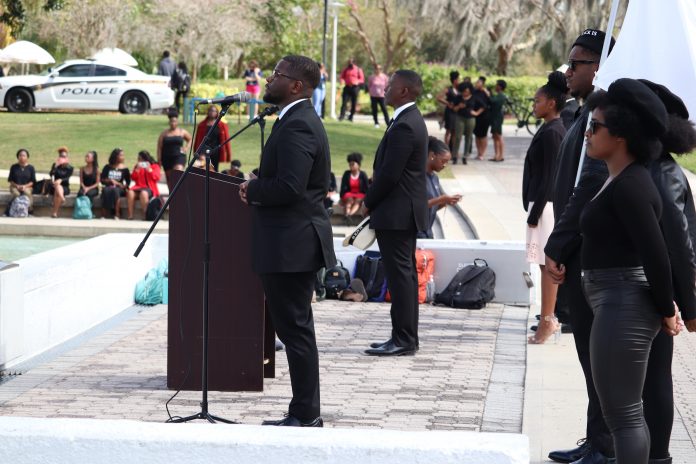Emmanual Davis stood tall in an all-black suit on at a podium with an oak casket behind him. He overlooked the UCF Reflecting Pond and read out the words of Martin Luther King, Jr.’s “I Have a Dream” speech to a crowd of about 30 students.
“When we allow freedom to ring – when we let it ring from every city and every hamlet, from every state and every city, we will be able to speed up that day when all of God’s children, black men and white men, Jews and Gentiles, Protestants and Catholics, will be able to join hands and sing in the words of the old Negro spiritual, ‘Free at last, free at last, great God a-mighty, we are free at last.’”
UCF’s Black Student Union and clothing brand BLACKIS recreated the Selma to Montgomery March on Feb. 20 at 1 p.m.
The march — which started at Memory Mall and ended at the Reflecting Pond — re-enacted “The Ballot or the Bullet” speech and the “I Have a Dream” speech.
This recreation was a part of a series of events called The Darkest Hour. The Darkest Hour was divided into four phases and was meant to celebrate Black History Month at UCF.
Phase one started at the UCF shuttle bus stops where participants were taught the significance of the Montgomery Bus Boycott.
Phase two allowed students to view and interact with black-owned businesses on campus. Phase three was the Selma to Montgomery March, which led to where phase four took place with the re-enactment of both speeches.
The Selma to Montgomery March was a part of a series of civil rights protests that occurred in 1965 in Alabama, in hopes to register black voters in the south. Protestors were arrested and faced violence, according to Stanford University’s Martin Luther King, Jr. Research and Education Institute website.
Travis Slocum, founder of BLACKIS and one of two speakers at the march, said with this march, BSU and BLACKIS have set a standard for every upcoming Black History Month event for the next generation at UCF.
“I give a challenge to every single student here at the university — every single person within the community in general,” Slocum said. “That every year we should always break through the barriers and exceed the standards of what it was last year. It’s the only way to grow.”
The “The Ballot or the Bullet” speech was one speech re-enacted at the march. The speech was given by Malcolm X in 1964 to push for civil and voting rights, according to the Digital History website.
Jasmine de Verrevil, senior social work major, said she participated in the re-enactment of the “I Have a Dream” speech to change the perception of what people thought of Black History Month.
“We don’t really get an opportunity like this,” de Verrevil said. “We shove Black History Month in the back because February is one of the shortest months in the year.”
King delivered his famous “I Have a Dream” speech in August 1963 to an approximate crowd of 250,000, according to the National Constitution Center website.
Davis, junior political science major, said this event brought more awareness to black history and other cultures at UCF.
“Having this event made [everyone] more aware [of] our black culture here at UCF and others … we have a community that cares about everybody,” Davis said. “I feel we should all come together even though we are from different places.”
Slocum said while King’s speech had the same undertone as Malcolm X’s speech, and each tells of the struggle African Americans faced in America, the two speakers had different approaches.
“Both speeches were not about religion, political gain or political favor,” Slocum said. “It’s understanding what freedom is, and what we seek as people. It’s blending both speeches to show that they each had the same objectives but had different ways of getting action.”




